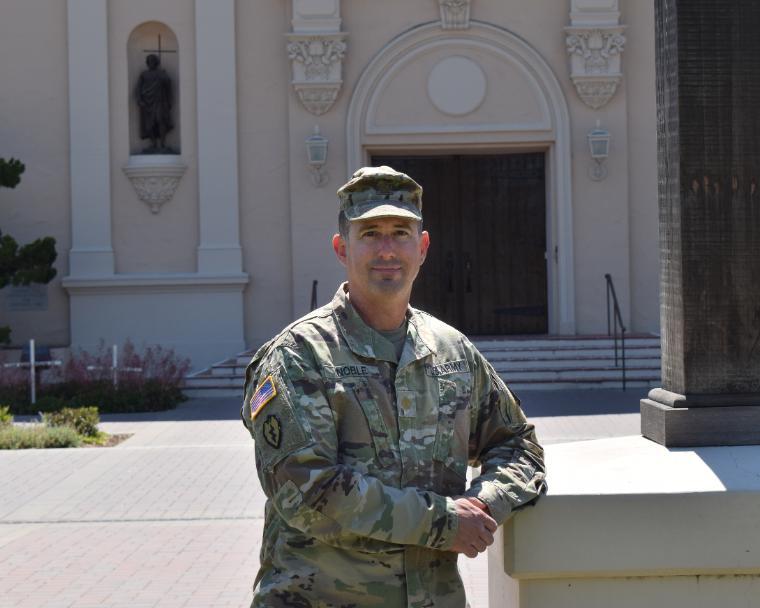
Uniformed Service
Tina Vossugh
Major Jason Noble can recall at least five different occasions where things could have taken a turn for the worse in his military career. He thanks God for keeping him safe, knowing others weren't as fortunate. We sat down with a reflective Major Noble and asked about his Memorial Day plans and what keeps him inspired.
What does Memorial Day mean to you and how do you choose to observe it?
I always like to take time, whether I’m in a ceremony or not, to find something to do and to take a little bit of time to think about what the holiday means. It’s a time to reflect back on the sacrifices made by the folks that went before us, because you know we’ve been doing this job for, for well over 200 years and there’s just a lot of great, great things that you can draw inspiration from. Memorial Day is a chance to reflect on the nation’s campaigns, the struggles that the nation has undergone and, and also similar to Veterans Day to pay homage to those that have gone before us in the pursuit of their goals. This Memorial Day I’ll be with the Santa Clara Veterans Association participating in a ceremony with the mayor, some other dignitaries, local folks, and some veterans who’ve served in the past.
Does the memory of those who sacrificed their lives inspire you in your military service?
I came in the army, as an officer. I was in flight school during 9/11 so my entire time as an officer has been in an army that’s at combat. At an early point in my career, in my mid-20s, I’d already had friends and colleagues that had made the ultimate sacrifice and had passed away at an early age. When you’re deployed or in a combat situation, instead of looking at the overall strategic objective of what you’re trying to accomplish, you’re really there just to get each other through. Unfortunately there are people who don’t make it, soldiers you’ve gotten to know and who’ve become your family. My respect for the fallen runs very deep and it inspires me to do my best every day in all that I do to serve.
What role do you play here at SCU in the ROTC Program?
I’m the Professor of Military Science. I am responsible for commissioning officers in the United States Army, Army Reserve, or National Guard when they graduate with their bachelor’s degree or master’s degree. The main goal is for the cadet to do well academically and also integrate into the community and have the full undergraduate experience. When they graduate they raise their right hand and we commission them as Second Lieutenants in the United States Army and shortly thereafter they go to do some advanced training depending on what their job is going to be in the military. If they’re active duty they go off and they’re professional soldiers for an amount of time and if they’re in the Reserves or Guard they may stay here in the community and continue to contribute to the local community while also being soldiers on the weekends and in the summer.
Given SCU’s long history with the ROTC program and alums like Rita Tamayo '76, how should the SCU community commemorate them on Memorial Day?
Rita Tamayo '76 was such a pioneer. She was the first female cadet battalion commander in the United States. That’s really, really a big deal, especially as we talk about gender equality and look at some of the initiatives that are currently going on in the nation. Her story only becomes more relevant. We need to tell her story. We have her pictures on the wall and have the Rita Tamayo Award in leadership that we give out each year to one of our female cadets. But, what a great thing it would be to tell her story.
Santa Clara’s connection to the military is strong and there are some absolutely fascinating and intriguing individuals that have gone through the program. We just had Former Defense Secretary Leon Panetta '60 J.D. '63 here speaking at this year’s Law commencement. Lieutenant General Kellogg '66 is now the Deputy National Security Advisor. And, we can’t forget Major General Yee '87 who serves at the Pentagon now. He will be here on June 17 for our ROTC commissioning ceremony. There are many more notable Bronco Battalion Army ROTC Graduates that I haven’t mentioned.
What role does a Jesuit education play in the ROTC program?
What the Jesuit education brings to the table is the importance of empathy and compassion. These are traits that we often overlook in leadership that are so critical. We talk in our curriculum that empathy and showing concern is a leadership attribute. It comes down to the basics of saying “we” instead of “I” and always exalting your people before yourself. That’s something I’ve found to be completely congruent with the Jesuit model.
It sounds a little paradoxical at first, but when you really peel back the onion the Jesuit philosophy and educational model and ROTC are really inextricably linked. It’s not only just words and philosophies and doctrines and ethos, but it’s also in the actions of how well we’re received and what a great relationship we have with the administration.